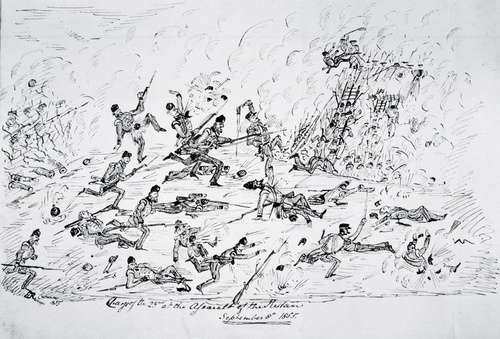
Auction: 20001 - Orders, Decorations and Medals - conducted behind closed doors
Lot: 647
An impressive 'Final Assault on the Redan' D.C.M. group of five to Colour-Sergeant T. Damaline, 23rd Foot (Royal Welch Fusiliers), who survived his Regiment's ordeal at the crossing of the Alma only to be wounded in an ill-managed though heroic attempt on the Redan bastion on 8 September 1855
Distinguished Conduct Medal, V.R. (Corpl. T. Damoline. 23rd R.W.Fusrs.), officially impressed naming, note surname spelling; Crimea 1854-56, 3 clasps, Alma, Inkermann, Sebastopol (Thomas. Damaline. Serjt. 23. R.W.F.), depot engraved naming, unofficial rivets between second and third clasps; Indian Mutiny 1857-59, 1 clasp, Lucknow (Cr. Serjt. Thos. Dammaline, 1st Bn. 23rd R.W.Fusrs.), note surname spelling; Army L.S. & G.C., V.R. (1688. Clr.-Sjt. T. Damaline, 1st Btn. 23rd Rgt.), small letter reverse, officially impressed naming; Turkish Crimea 1855, Sardinian die, (Cr. Sergt. T. Damaline. 23rd R.W.F.), depot engraved naming, fitted with replacement 'Crimea' suspension, all with original ribands, good very fine (5)
Thomas Damaline was born at Blackburn, Lancashire in 1821. A shoemaker by trade, he attested for the 1st Battalion, 23rd Foot (Royal Welch Fusiliers) at Blackburn on 7 December 1840, with the Regimental Number '1688'. He served in Canada for 11 years and 1 month, rising to Corporal on 1 May 1853 before receiving Good Conduct Pay on 28 March 1854. At the Battle of the Alma on 20 September that year, the 23rd made a frontal assault on the Great Redoubt, a formidable earthwork bristling with Russian artillery. Part of Sir George Brown's Light Division, the 23rd waded across the River Alma at 2 p.m. and surged forward, losing all sense of order and cohesion. The regiment bunched up and in some cases were 16 men deep, presenting an ideal target for shells and grapeshot. The 23rd seized their objective with terrible loss. Captain Bell won the Victoria Cross for capturing a Russian howitzer and scratching '23' on its cascabel with his sword. At this crucial point, British reinforcements failed to arrive to consolidate the position. The Russian Vladimir Regiment counter-attacked and drove the 23rd back from their hard-won gains. In this battle the Royal Welch Fusiliers lost eight officers and 45 men killed, five officers and 152 men wounded (Hope 2003, 115).
Damaline took part in the Battle of Inkermann on 5 November, and was promoted to Sergeant on 9 May 1855, during the Siege of Sebastopol. This city's defence was superbly organised by General Todleben, a German in Russian service. Having resisted Allied assaults for almost a year, Sebastopol was subjected to an epic Allied bombardment on 5 September, involving 13,000 shells and 90,000 round shot fired from 800 guns over 72 hours (see Pemberton 1962, 214). The 'Final Assault' on the Redan then commenced. The 23rd were at the forefront of the British attack - the subject of a pen-and-ink drawing made at the scene by Lieutenant Radcliffe of the 23rd (illustrated), now held in the National Army Museum. As Radcliffe's drawing shows, the 23rd suffered severe casualties while advancing across open ground: two officers and 46 men killed, ten officers and 207 men wounded, and 25 'missing'. Damaline was slightly wounded during this assault, in which two Victoria Crosses were earned by the Regiment. He received the Distinguished Conduct Medal with £10 gratuity in 1855, likely for his gallantry during this hopeless engagement. The scaling ladders were of insufficient length; the attempt on the Redan failed yet again.
French Zouaves nevertheless succeeded in capturing the Malakoff redoubt, forcing the Russians to abandon Sebastopol that night. Allied victory was confirmed by the Treaty of Paris on 30 March 1856.
The Royal Welch Fusiliers were ordered to participate in the ongoing Second China War, but news of the Indian Mutiny forced them to divert at Singapore and land at Calcutta. There they joined the force being assembled by Sir Colin Campbell for the Relief of Lucknow, Damaline earning a 'Lucknow' clasp to his Indian Mutiny Medal. He advanced to Colour-Sergeant on 13 August 1858, and received the Long Service and Good Conduct Medal with a gratuity of £5. His discharge papers reveal a man of 'very good' character who was never tried by Court-Martial. Discharged at Walmer, Kent on 12 December 1861, Damaline retired to Preston in Lancashire and was buried on 15 May 1871; sold with copied service papers and medal confirmation.
Subject to 20% VAT on Buyer’s Premium. For more information please view Terms and Conditions for Buyers.
Sold for
£3,800
Starting price
£1600




